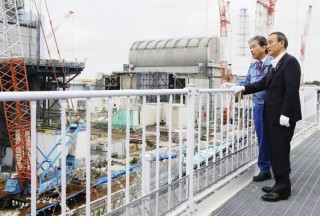Loading
Search
▼ Suga, In Fukushima, Vows To Continue Recovery Efforts For 2011 Disasters-Hit Areas
- Category:Other
FUKUSHIMA - Prime Minister Yoshihide Suga vowed Saturday to press forward with reconstruction efforts for areas devastated by the 2011 earthquake and tsunami, as he visited the Fukushima nuclear power plant crippled by the disasters.
He made the comment after there was no mention of the disasters, or rebuilding work for the northeastern Tohoku region, in his Cabinet's basic policies adopted at its first meeting last week.
Suga told reporters during his first official trip since he took office that when he formed the new cabinet, he wrote of the need to continue reconstruction efforts in instructions handed out to all the cabinet members.
"There is no recovery of Tohoku, without recovery of Fukushima, and there is no revival of Japan without recovery of Tohoku. This is a basic policy of my cabinet," he said.
Fukushima is one of three prefectures in northeastern Japan hit hardest by the disasters that left nearly 15,900 people dead and more than 2,500 unaccounted for.
The Abe administration's set of basic policies included the pillar of disaster recovery from its inception in 2012. Suga said Friday during a meeting on the rebuilding of the devastated areas that he will "inherit the policy" from the previous administration.
"We want to make a decision as soon as possible" on radioactive water now being stored at the Fukushima Daiichi nuclear power station, he said.
The government and the plant owner, Tokyo Electric Power Company Holdings Inc, are considering how to dispose of the water, which has been contaminated with radioactive materials after being used to cool the melted fuel cores at the plant.
They are looking at options such as releasing it into the Pacific Ocean or evaporation but local fishermen have voiced opposition due to fears consumers would shun seafood caught nearby.
The water is being treated using an advanced liquid processing system, or ALPS, to remove most contaminants other than the relatively nontoxic tritium. It is being stored in tanks on the facility's premises but space is expected to run out by the summer of 2022.
Suga also visited a museum on the disasters and met with students from local junior and senior high schools as part of the official trip.
© KYODO
- September 27, 2020
- Comment (0)
- Trackback(0)


